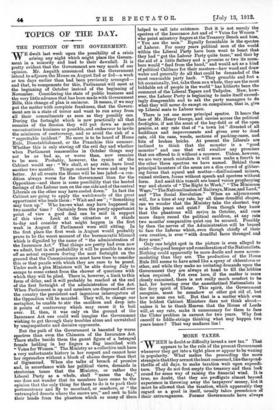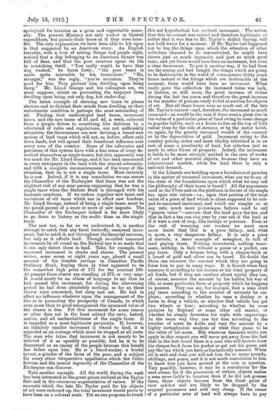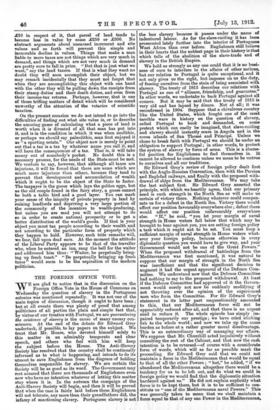MORE TAXES.
" ANTHEN in doubt or difficulty invent a new tax." That appears to be the rule of the present Government whenever they get into a tight place or appear to be waning in popularity. What makes the proceeding the more strange is that they are not the least concerned, like the spend- thrifts of old days, to make taxation wait upon expendi- ture. They do not first empty the treasury and then look round for some way of raising the financial wind. It is true, no doubt, that they are profligate almost beyond experience in throwing away the taxpayers' money, but it must be allowed that the taxation, which apparently they regard as a good in itself, usually takes precedence of their extravagances. Former Governments have always apologized for taxation as a grim and regrettable neces- this not hypothetical but realized increment. The notion sity. The present Ministry not only wallow in bloated expenditure, but parade their taxes as if they were bene- fits. The only explanation we have been able to hit upon is that suggested by an American story. An English traveller, with a love, of setting things and people right, noticed that a dog belonging to an American. farmer was full of fleas, and that the poor creature spent its life in scratching itself. " You really ought to have that dog washed," he burst forth ; "the poor beast is made quite miserable by his tormentors." "No, stranger," was the reply, "you're mistaken. They're good for him. They prevent him dwelling upon being dawg." Mr.. Lloyd George and his colleagues are, we must suppose, intent on preventing the taxpayer from dwelling upon being, not only dog, but under-dog.
The latest example of devising new taxes to please electors and to distract their minds from dwelling on their unfortunate condition is perhaps the most astounding of all. Finding that undeveloped land taxes, increment taxes, and the new taxes of 3d. and 4d. a week, collected from a people driven to something like delirium by a whirlwind of rules and regulations, are not sufficiently attractive, the Government are now devising a brand-new system of land taxes which will not, as before, affect only town lands, but will spread their beneficent influence over every acre of the country. Some of the advocates and patentees of this system have with a fine sense of irony de- scribed themselves as single taxers, but this apparently was too much for Mr. Lloyd George, and it has been announced in every newspaper in. the land with the utmost solemnity, and with a complete unconsciousness of the irony of the situation, that he is not a single taxer. Most certainly he is not. Indeed, if it is any consolation we can assure the Chancellor of the Exchequer that there was not the slightest risk of any sane person supposing that he was a single taxer when the Statute Book is thronged with his fantastic creations. If we reckon together new taxes and variations of old taxes which are in effect new burdens, Mr. Lloyd George, instead of being a single taxer, must be the proud parent of a score or more of new imposts. The Chancellor of the Exchequer indeed is far more likely to go down to history as the multi- than as the single- taxer.
The new tax, so far as we understand it, is another attempt to catch that shy fiscal butterfly, unearned incre- ment, but to catch it, not throughout the financial universe, but only as it affects land. Though so-called unearned increments lie all round us, the Radical eye is so made that it can only detect them in land. Take, for example, the unearned increment in stocks and shares. The present writer, some seven or eight years ago, placed a small amount of his humble savings in Canadian Pacific Ordinary Stock, buying them at what appeared to be the somewhat high price of 175 for the nominal 100. At present these shares are standing at 275, or very near. It would surely be an abuse of language to say that he had earned this increment, for during the intervening period he had done absolutely nothing, so far as these shares were concerned, but sleep and eat. He had in effect no influence whatever upon the management of the line or in promoting the prosperity of Canada, to which even more than to good management the increased value of the shares is due. Yet this increment for some reason or other does not in the least attract the envy, hatred, malice, and all uncharitableness of the single taxer. It is regarded as a most legitimate perquisite. If, however, an infinitely smaller increment is traced to land, it is regarded as an outrage which must be stopped at all costs. The man who takes that increment is not merely to be relieved of it as speedily as possible, but he is to be denounced as an enemy of the people because this benefit has fallen upon him. He is a blood-sucker, a feudal tyrant, a grinder of the faces of the poor, and a subject for every other vituperative appellation which the Celtic fervour and the mental ingenuity of the Chancellor of the Exchequer can discover.
Take another example. All the world during the week has been interested in the great prices realized at the Taylor Sale and in the enormous augmentation of values. If the amounts which the late Mr. Taylor paid for his objects of art were reckoned up, the total increment would prove to have been on a colossal scale. Yet no one proposes to touch that this increment was earned and therefore legitimate, or rather that it was due to Mr. Taylor's skilful buying, will not hold water for a moment. If Mr. Taylor had happened not to buy the things upon which the attention of other collectors chanced to be concentrated, he might have shown just as much ingenuity and just as much good taste, and yet there would have been no increment, but even a clear decrement. To put it another way, if he had been too far-seeing and had bought the things which are going to be fashionable in the world of connoisseurs thirty years hence instead of the things which are fashionable at the moment, there would have been no increment. What really gave the collection its increased value was luck, or fashion, or, still more, the great increase of riches during the last ten years, and therefore the great increase in the number of persons ready to bid at auction for objects of art. But all these forces were as much out of the late Mr. Taylor's control—and, therefore, the increment as much unearned—as would be the case if there were a great rise in the value of a particular piece of land owing to some change in popular habits, such as a desire to live on the top of hills rather than by the side of streams, or by the motor habit, or, again, by the greatly increased wealth of the country or by the depreciation of gold. Increment owing to the country getting richer and more thickly inhabited is in no sort of sense a peculiarity of land, but attaches just as much to other forms of property. Indeed, the increment is liable to be more strongly marked in the case of works of art and other movable objects, because they have an international market, while for land there is only a national demand.
If the Liberals are building upon a foundation of paradox in the matter of unearned increment, what are we to say of the state of the foundations upon which what we may call the philosophy of their taxes is based P All the arguments used in the Press and on the platform in favour of the single tax upon site values—i.e., upon that portion of the total value of a piece of land which is alone supposed to be sub- ject to unearned increment, and which our simpler or, at any rate, much more picturesque fathers used to call "prairie value "—assume that the land pays the tax, and that in fact a tax can rise year by year out of the land as if it were a sort of crop, like turnips or potatoes. Even at the risk of wearying our readers we must once more insist that this is a pure fallacy, and, what is more, a very dangerous fallacy. It is only a piece of rhetoric, a mere example of metaphor, to talk of land paying taxes. Nothing immaterial, nothing inani- mate, nothing, in fact, without a purse or a pocket, can pay taxes. Only a human being with a cheque-book or a hoard. of gold and silver can be taxed. No doubt the State can measure the amount which they are going to force him to pay. in many ways. It is fairest when they measure it according to his income or his total property of all kinds, but if they are careless about equity they can,, of course, measure the amount by his habits, his way of life, or some particular form of property which he happens to possess. They can say, for example, that a man shall pay taxes according to the number of servants he em- ploys ; according to whether he uses a donkey or a horse to drag a vehicle, or whether that vehicle has got two wheels or four ; according to whether he owns pictures by Raphael or some other old. master, or whether he simply decorates his walls with engravings. In the same way they can tax him according to the number of acres he holds and vary the amount by a highly metaphysical analysis of what they guess to be the value of his acres. But whatever fantastic tricks you apply in this respect you will never get away from the fact that in the last resort there is a man who will have to draw his cheque-book from his pocket or get out his purse and pay the tax which you have so fantastically assessed. When all is said and done you will ask him for so many pounds, shillings, and pence, and it is not much consolation to him to know how you have arrived at the sum in question. Very possibly, however, it may be a consolation for the next owner, for if the possession of certain objects makes a man more liable to taxation than if he did not possess them, those objects become from the fiscal point of view red-hot and are likely to be dropped by the original possessors and sold very cheap. If the owner of a particular acre of land will always have to pay £10 in respect of it, that parcel of land tends to become less in value by some £250 or £300. No abstract arguments about unearned increment and site values and so forth will prevent this simple and inexorable decline in values. Things that make a man liable to more taxes are not things which are very much in demand, and things which are not very much in demand are pretty sure to fall in price. "But that is just what we want," say the land taxers. If that is what they want no doubt they will soon accomplish their object, but we may remark incidentally that they must not forget that when they are accomplishing this object with one hand with the other they will be pulling down the receipts from their stamp duties and their death duties, and even from their income-tax returns. Perhaps, however, that is one of those trifling matters of detail which will be considered unworthy of the attention of the votaries of scientific taxation.
On the present occasion we do not intend to go into the difficulties of findi g out what site value is, or to describe the amusing game of calculating what a piece of land is worth when it is divested of all that man has put into it, and is in the condition in which it was when neolithic, or perhaps we should say palwolithic, man first enjoyed it as " a sporting estate." Our object now is merely to point out that a tax is a tax by whatever name you call it, and will have the consequences of a tax. That is, it will take money out of somebody's pocket. No doubt this is a necessary process, for the needs of the State must be met. We venture to say, however, that although all taxes are injurious, it will be found that there are some which are much more injurious than others, because they tend to prevent that development and accumulation of wealth which it ought to be the object of the State to foster. The taxpayer is the goose which lays the golden eggs, but as the old couple found in the fairy story, a goose cannot be both a table bird and a good layer. You can mark your sense of the iniquity of private property in land by ruining landlords and depriving a very large portion of the community of the incentive to wealth-producing, but unless you are mad you will not attempt to do so in order to create national prosperity or to get a better distribution of the world's goods. If that is your object you must tax people according to their wealth and not according to the particular form of property which they happen to hold. However, such trite remarks will, we fear, fall upon deaf ears. At the moment the attitude of the Liberal Party appears to be that of the traveller who, when he entered an inn, rang the bell for the waiter and addressed him thus : " Waiter, be perpetually bring- ing up fresh toast." "Be perpetually bringing up fresh taxes " would seem to be the aspiration of the modern politician.








































 Previous page
Previous page